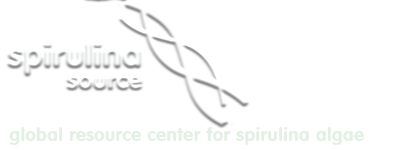![]() Spirulina Supplementation in Pregnant Women in the Dakar Region (Senegal)
Spirulina Supplementation in Pregnant Women in the Dakar Region (Senegal)
by Khadim Niang, et al. 2017. Open Journal of Obstetrics and Gynecology, 2017, 7, 147-154 http://www.scirp.org/journal/ojog. ISSN Online: 2160-8806. ISSN Print: 2160-8792.
The fight against iron deficiency anemia in pregnant women is a public health prior-ity, especially in sub-Saharan Africa. Spirulina is an alga very rich in iron, used as a dietary supplement. This research proposes to study its effect on the hemogloblobi-naemia of pregnant women. This was a blind randomized cohort study with a sup-plemented group of spirulina (1500 mg/d) and a second supplemented with iron and folic acid supplementation (IFAS). Included in this study were pregnant women at-tending four health centers in the Dakar region, with pregnancy at 28th amenorrhea, agreeing to participate and not having complications or twin pregnancies. Follow-up of the two groups was identical throughout the study from the 28th week of amenor- rhea to the 42nd postnatal day. The study was conducted among 920 women, evenly distributed among the groups. IFAS allowed a statistically significant increase in he-moglobinemia with an average gain of 0.3 g/dl between the 28th and 32nd weeks of amenorrhea (p = 0.022) and 0.2 g/dl between the 28th week and the delivery (p = 0.043). Spirulina supplementation showed statistically higher gains than those observed with IFAS. These gains were 0.48 g/dl between the 28th and 32nd weeks of amenorrhea and 0.36 g/dl between the 28th week and the delivery, with p values less than 0.001. Spirulina, more accessible to developing countries, is a good option to strengthen the arsenal of iron deficiency anemia control, and therefore maternal mortality.




